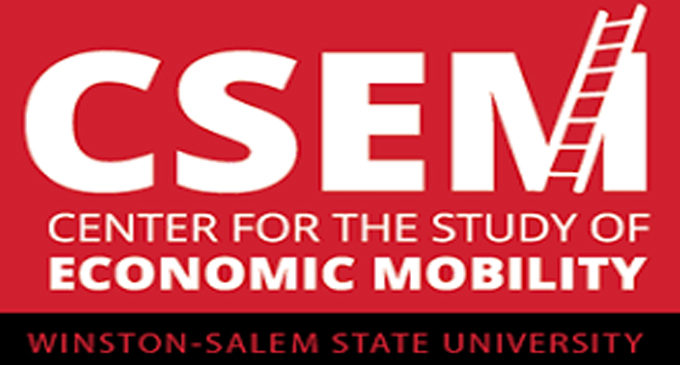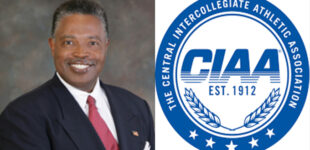CSEM, Forsyth Tech joint study reveals high cost of transportation challenges

By John Railey
Groundbreaking research by Winston-Salem State University’s Center for the Study of Economic Mobility (CSEM), initiated by Forsyth Technical Community College (FTCC), reveals that transportation challenges are taking a heavy toll on the college’s student productivity. The college, which works hard at economic mobility, is adversely impacted by urban sprawl and the transportation costs that come with it, just are so many other institutions and individuals here and nationwide. The CSEM study, done in partnership with Forsyth Tech, is helping lead the way to beneficial change for Forsyth Tech and other institutions.
Mike Massoglia, director of grant writing and development at Forsyth Tech, noted, “From helping us put together a student survey, to providing a thorough and provocative analysis of the results, CSEM has been a critically important partner. What struck us most about the report was the potential impact of transportation barriers on Forsyth Tech’s bottom line, let alone on the lives and economic mobility of our students: more than $1 million in lost state revenue from the thousands of credit-hours not taken.
Stacy Waters-Bailey, Forsyth Tech’s executive director of student support services, said, “We are, of course, very excited about the study and getting the results.” She serves on a task force made up of administrators, faculty and staff that will consider ways of applying the data into the new year. The data confirm stories they had heard from the students, she said, and the students added much more as they answered survey questions.
“You realize that the impact of transportation in Winston-Salem is much wider and more ingrained than we’d even imagined,” Waters-Bailey said. “CSEM’s report provided the initial data the college needed to better understand and lay a foundation for further analysis which will help make an impact for students and the community.”
Earlier CSEM research on riders who use Winston-Salem Transportation Authority (WSTA) buses to get to work helped encourage The Winston-Salem Foundation to set up a grant program aimed at finding innovative solutions to transportation problems. Forsyth Tech won one of the grants to study its transportation challenges and commissioned CSEM for the research.
“Students tell us that in some cases, they miss classes offered for their major, take fewer credits, and have less access to professors than desired due to transportation challenges,” CSEM Research Manager Zach Blizard and CSEM Director Craig Richardson write in their commissioned report: A Study of Forsyth Technical Community College Students: How Do Transportation Challenges Impact Their Educational Experience?
Among the internal study’s key findings due to their transportation challenges of getting to campus:
*Approximately 64% of responding students state that they have been late to class at least once.
*Around 10% of responding students state that they have had to drop at least one class.
*Around 57% of responding students state that they would do more school-related activities, such as homework, studying, or attending a study group, with time saved from quicker commutes.
*Tuition impact on the institution and state due to students’ transportation challenges: Between $405,156 to $633,688 in foregone tuition revenue from current FTCC students.
*Between $671,232 to $1,039,680 in foregone tuition revenue from prospective FTCC students. (Assuming a semester includes 12 credit hours and that a single class is worth 3, the results suggest that prospective Forsyth Tech students missed out on taking between 1,777 and 2,796 classes during the 2018-19 year because of transportation challenges).
*Around 60% of responding bus riding students know at least one person who would attend Forsyth Tech if the bus schedule better fit his/her needs.
Waters-Bailey said there may also be ancillary costs, such as students not reaching their full potential and earning a living wage, which may mean the full costs are higher than the study estimate.
Some 1,001 Forsyth Tech students participated in the survey and 788 of those students fully completed it. Amy Braswell, Belinda Brewster-Clémence and Mike Massoglia of Forsyth Tech helped in creating the survey design, implementing the survey questions, and coding the data for CSEM analysis.
“The results of the survey suggest that transportation has a sizeable impact on FTCC’s students, especially those without personal vehicles, such as students who rely on the public bus or taxis/Ubers,” CSEM authors Blizard and Richardson write. “Considering a community college education can enhance one’s economic mobility, these peoples’ upward mobility, then, is being affected.”
Blizard and Richardson reported that “The vast majority of responding students (83.5%) use a personal vehicle to commute to campus. Around 9.3% ride with a family member/friend, 2.8% use a public bus, and 1.1% use a taxi\Uber\Lyft. There are only 27 students in our entire sample that commute to campus using a public bus.” This indicates some potential future opportunities if the bus system and class schedules better intersect with each other.
Although bus-riding students face the most challenges, the study indicated all the responding students were adversely impacted, albeit in varying degrees, by factors ranging from traffic jams to long walks across campus.
Blizard and Richardson write that “Based on the findings, FTCC should strongly consider innovative approaches to student transportation. Efforts to reduce commute times, enhance transportation efficiency, and scheduling consistency will have sizeable impacts by reducing the frequencies of dropped classes and late class arrivals. Additionally, students will have greater flexibility to visit teachers during office hours and also speed up the rate at which they can finally graduate.”
They write that solutions might include:
*Trams/golf carts/vans that take students from the parking lot to the heart of campus.
*FTCC student buses that link up the various campus locations with regular schedules.
*For local students with demonstrated transportation issues, provide webinar options for in-class only courses.
*Design course locations and times to optimize course times and locations so that travel times and distances for students are minimized on average.
*Schedule class times around existing city bus schedules or work with the Transit Authority to modify bus schedules to better serve FTCC students’ needs to get to class on time.
Waters-Bailey said options the task force are already looking at include a campus bus loop and working with WSTA on more direct routes to its campuses. “We want to be a good partner,” she said. “We want to help our students, but we also want to help the community as well.”
Forsyth Tech, a crucial institution, showed its community leadership once again by leading the way on the transportation study.
John Railey, raileyjb@gmail.com, is the writer in residence for CSEM, www.wssu.edu/csem.














